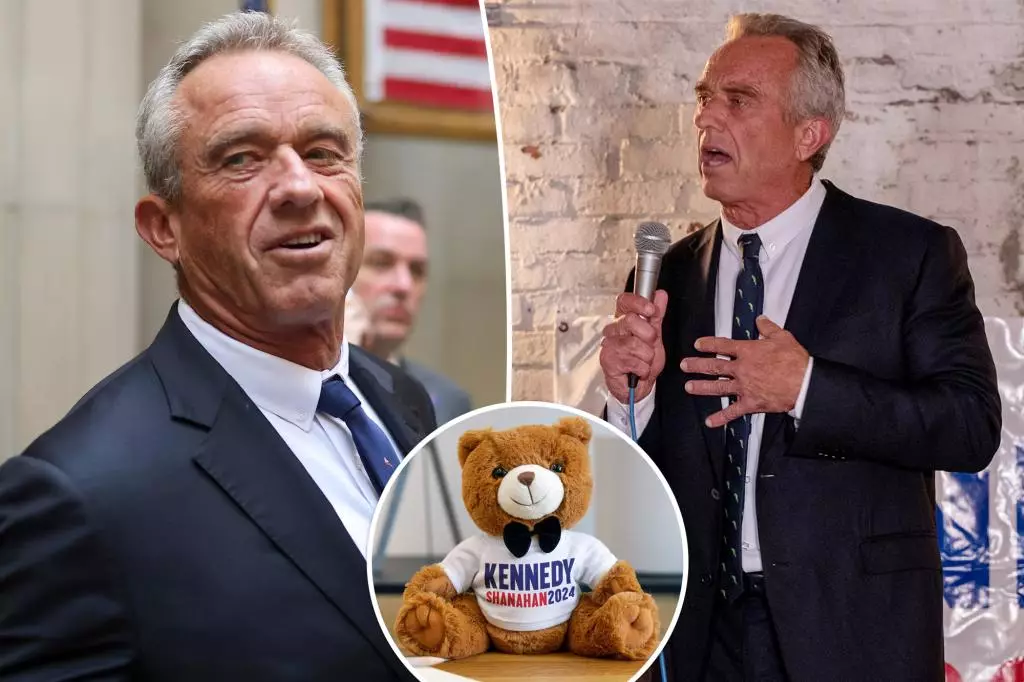Robert F. Kennedy Jr. finds himself at the intersection of a deeply scrutinized personal life and a controversial political journey. Recent headlines have spotlighted accusations ranging from contentious romantic relationships to his high-profile endorsement of Donald Trump, a move that has shattered familial allegiances and ignited fierce criticism. Despite the storm of negative press, insiders suggest that Kennedy remains steadfast in his political ambitions and sense of purpose, viewing his tumultuous path as part of a greater mission. He appears unfazed, claiming to fight for a cause he considers divinely inspired.
The intense scrutiny surrounding Kennedy’s personal life is only exacerbated by the claims of infidelity and the ensuing sexting scandal. While he vocally denies any wrongdoing, outside media narrations often paint a more scandalous picture, suggesting a complicated web of personal connections that contradicts the image he seeks to uphold. A source close to him stated that despite the backlash, he anticipated the fallout from these revelations, indicating a level of awareness about the possible repercussions of his lifestyle choices on his political career.
In August, RFK Jr. shocked many by endorsing Donald Trump, a landmark decision that alienated him from several members of the renowned Kennedy clan. Family members publicly expressed their disappointment, labeling the endorsement a betrayal of shared values and vision. The Kennedy family has long been associated with the Democratic Party, making this break all the more pronounced and controversial. Their collective statement articulated hopes for an America characterized by unity and progress, in stark contrast to the divisive nature of Trump’s political persona.
This endorsement seems to reflect not just a personal betrayal from the perspective of his family but underscores deeper ideological divides within the Kennedy lineage. The historical context of the family’s long-standing allegiance to Democratic ideals contrasts sharply with RFK Jr.’s pivot, marking a significant departure from the liberal values that many expect from a Kennedy.
Adding to the complexity of his situation are the newly surfaced allegations of affairs, particularly highlighting a controversial interaction with New York Magazine writer Olivia Nuzzi. Reports of their connection have attracted significant media attention, with claims that they engaged in intimate conversations that teetered between romantic and sexual. In the wake of these revelations, Kennedy’s wife, actress Cheryl Hines, reportedly found herself grappling with profound emotional distress, considering pulling away from their marriage. Hines represents an often-overlooked side of Kennedy’s public narrative, one that contrasts his political ambitions with the reality of a troubled personal life.
Kennedy’s admission that Hines was uncomfortable with his endorsement of Trump showcases the strains his political decisions have placed on his personal relationships. Hines’ longstanding Democratic values clash with her husband’s association with a figure many Democrats view as antithetical to their core beliefs. In light of this, the couple’s public appearances, such as their recent sighting in Malibu, pose a compelling question about the boundaries of political allegiance and personal loyalty.
Amidst the personal turmoil and familial discord, there emerges a sense that Kennedy is not merely seeking validation but is on a quest to define his political identity independently of his storied lineage. The challenges presented by his endorsement of Trump and his controversial romantic entanglements seem less like barriers and more like catalysts for a new chapter in his life. Whether one views this as a spiritual crusade or a desperate attempt for relevance, RFK Jr.’s journey embodies a paradox: a man trying to forge a path forward while simultaneously haunted by the shadows of those who came before him.
In this precarious balancing act, Robert F. Kennedy Jr. navigates uncharted waters, determined to assert his voice despite the cacophony of dissent surrounding him. His saga serves not only as a personal narrative but as a reflection of the larger currents shaping contemporary American politics, where legacy, individuality, and public perception are in constant flux.
